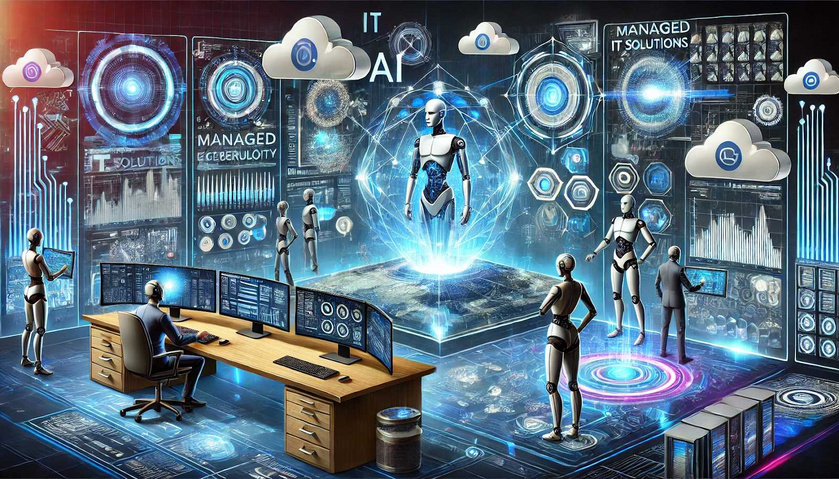As businesses increasingly rely on technology to drive operations, the demand for managed IT solutions continues to grow. Companies across industries are seeking ways to enhance efficiency, improve security, and streamline operations. The future of managed IT solutions is being shaped by advancements in artificial intelligence (AI), automation, and cybersecurity, making IT services more sophisticated, proactive, and resilient.
In this article, we explore how AI, automation, and cybersecurity trends are transforming managed IT solutions, ensuring businesses can stay ahead in an evolving digital landscape.
AI-Powered Managed IT Solutions
1. Predictive Analytics and Proactive IT Management
One of the most significant applications of AI in managed IT solutions is predictive analytics. AI-driven systems analyze vast amounts of data to detect patterns and predict potential issues before they arise. This proactive approach helps IT providers prevent downtime, optimize performance, and reduce costly disruptions.
For example, AI-powered monitoring tools can identify irregular system behaviors and notify IT teams before they escalate into major problems, allowing businesses to maintain seamless operations.
2. AI-driven IT Support and Chatbots
AI is revolutionizing IT support through the use of virtual assistants and chatbots. These intelligent tools can handle routine inquiries, troubleshoot common issues, and guide users through technical problems without requiring human intervention. AI-powered IT support enhances efficiency and ensures businesses receive prompt assistance, reducing response times and improving customer satisfaction.
3. Automated System Maintenance and Updates
AI-driven automation plays a crucial role in managing IT infrastructure by handling routine maintenance tasks such as software updates, patch management, and system optimizations. By automating these processes, managed IT solutions providers can ensure that systems remain secure, up to date, and operating at peak efficiency without disrupting daily business activities.
The Role of Automation in Managed IT Solutions
1. Streamlined IT Operations
Automation eliminates manual tasks and optimizes IT workflows, allowing businesses to operate more efficiently. Automated IT solutions help companies manage network configurations, deploy applications, and perform system diagnostics with minimal human intervention. This reduces errors, enhances scalability, and allows IT professionals to focus on strategic initiatives.
2. Enhanced Incident Response
Automated security protocols are essential for detecting and responding to cyber threats in real-time. Security automation enables IT providers to identify anomalies, quarantine affected systems, and deploy countermeasures instantly. With the rise of sophisticated cyber threats, automated incident response mechanisms help minimize damage and protect business assets.
3. Self-Healing IT Systems
Advanced managed IT solutions are incorporating self-healing capabilities powered by automation. These systems can detect performance issues and automatically take corrective actions, such as reallocating computing resources or restarting malfunctioning processes. This innovation reduces downtime, improves resilience, and enhances overall system reliability.
Cybersecurity Trends in Managed IT Solutions
1. Zero Trust Security Frameworks
The traditional security perimeter is becoming obsolete as cyber threats evolve. Businesses are now adopting Zero Trust security models, which assume that no user or device should be trusted by default. Managed IT solutions providers are implementing strict authentication protocols, multi-factor authentication (MFA), and real-time monitoring to enforce Zero Trust principles.
2. AI-Driven Threat Detection and Response
AI is playing a vital role in strengthening cybersecurity by analyzing vast amounts of network data to detect unusual activities and potential threats. AI-driven threat detection systems can identify malware, phishing attempts, and insider threats before they cause harm. These solutions help businesses stay ahead of cybercriminals and improve their overall security posture.
3. Ransomware Protection and Endpoint Security
Ransomware attacks are on the rise, posing significant risks to businesses of all sizes. Managed IT solutions providers are incorporating advanced endpoint security measures, such as AI-driven anti-malware tools, endpoint detection and response (EDR), and automated backups. These solutions help businesses recover quickly from attacks and minimize data loss.
4. Compliance and Data Protection
With increasing regulations such as GDPR and CCPA, businesses must prioritize compliance and data protection. Managed IT solutions providers offer automated compliance monitoring and data encryption services to ensure that organizations meet regulatory requirements and protect sensitive information.
The Future of Managed IT Solutions
1. AI-Enhanced IT Decision-Making
As AI continues to evolve, it will play a greater role in IT decision-making. Businesses will leverage AI-driven insights to optimize infrastructure investments, allocate resources more effectively, and anticipate technology needs based on predictive analytics.
2. Hybrid Cloud and Edge Computing
The adoption of hybrid cloud solutions and edge computing is reshaping managed IT services. Businesses are moving toward distributed IT environments where data processing happens closer to the source. Managed IT providers are developing new strategies to manage hybrid and multi-cloud infrastructures efficiently while maintaining security and performance.
3. Managed IT as a Service (MITaaS)
Managed IT solutions are transitioning toward a more service-based approach, with providers offering subscription-based models that provide on-demand IT support, cybersecurity protection, and cloud management. This shift makes enterprise-grade IT solutions more accessible to small and mid-sized businesses, ensuring they can compete in the digital economy.
4. Integration of IoT and AI-Driven Security
The Internet of Things (IoT) is rapidly expanding, and businesses must secure their growing number of connected devices. Managed IT providers are integrating AI-driven security solutions that monitor IoT ecosystems, detect anomalies, and enforce security policies automatically. These advancements help businesses protect their networks from potential vulnerabilities.
Conclusion
The future of managed IT solutions is being shaped by AI, automation, and cybersecurity innovations. Businesses that leverage these advancements will experience greater efficiency, stronger security, and enhanced resilience in an increasingly complex digital landscape. As technology continues to evolve, managed IT providers will play a crucial role in helping organizations navigate emerging challenges, stay competitive, and secure their digital assets.




















